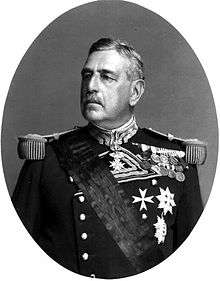Prospero Colonna di Paliano
| The Honourable Prospero Colonna SMOM | |
|---|---|
 | |
| Mayor of Rome | |
|
In office 6 July 1914 – 8 June 1919 | |
| Preceded by | Ernesto Nathan |
| Succeeded by | Adolfo Apolloni |
|
In office December 1899 – October 1904 | |
| Preceded by | Emanuele Ruspoli |
| Succeeded by | Enrico Cruciani Alibrandi |
| Senator of the Kingdom | |
|
In office 16 June 1900 – 16 September 1937 | |
| Monarch | Umberto I |
| Member of the Italian Chamber of Deputies | |
|
In office 10 June 1895 – 17 May 1900 | |
| Constituency | Anagni |
| Personal details | |
| Born |
18 July 1858 Naples, Two Sicilies |
| Died |
16 September 1937 (aged 79) Rome, Italy |
| Spouse(s) | Maria Ignazia Massimo |
| Children |
Mario Pietro Fabrizio |
| Profession | Landowner, military officer |
| Religion | Roman Catholicism |
Prospero Colonna, Duke of Rignano, Prince of Sonnino (18 July 1858 – 16 September 1937) was an Italian politician and aristocrat. He was twice mayor of Rome (1899-1905, 1914-1919). He served in the Chamber of Deputies and Senate of the Kingdom of Italy.
Biography
Propsero was born in Naples, son of Giovanni Andrea I Colonna, a landowner, and Isabella Alvarez di Toledo. He descend from the House of Colonna, an ancient aristocrat family. In his youth, he married Maria Ignazia Massimo, and they had 3 children: Mario, Piero (future Fascist politician) and Fabrizio. In 1895, Colonna was elected for Anagni in the Chamber of Deputies, supported the Historical Right. He resigned his charge in 1900.
In the same year, Colonna became Senator and Mayor of Rome yet. During his term, Rome completed the streetcar line, including a passage under the Quirinal Hill.[1] On June 1904 the IOC's President Pierre de Coubertin designate Rome to organised the IV Olympic Games, but Colonna refused for the difficult status of the city treasure. Despite the help request to the government, the Prime Minister Giovanni Giolitti refused to help the city. Finally, Colonna resigned his office.[2]
When the First World War started, Colonna joined in the Italian Royal Army as cavalry colonel. However, he never participated in battles, like he was appointed "military" mayor of Rome. In 1919, he resigned the office again and retired from politics. He died in 1937.
References
- ↑ Alla presenza del sindaco Prospero Colonna, rotto il diaframma sotto il Quirinale. Il Traforo sarà pronto in due anni, Corriere della Sera, 13 January 1901
- ↑ Tito Forcellese (2013). L'Italia e i giochi olimpici: un secolo di candidature : politica, istituzioni e diplomazia sportiva. FrancoAngeli.
External links
- "Scheda di Prospero Colonna sul sito della Camera dei Deputati".
- "Scheda di Prospero Colonna sul sito del Senato".
- Bartoccini, Fiorella (1982). "COLONNA, Prospero". Dizionario Biografico degli Italiani (in Italian). 27.
| Preceded by Emanuele Ruspoli, 1st Prince of Poggio Suasa |
Mayor of Rome 1899–1905 |
Succeeded by Enrico Cruciani Alibrandi |
| Preceded by Ernesto Nathan |
Mayor of Rome 1914–1919 |
Succeeded by Adolfo Apolloni |